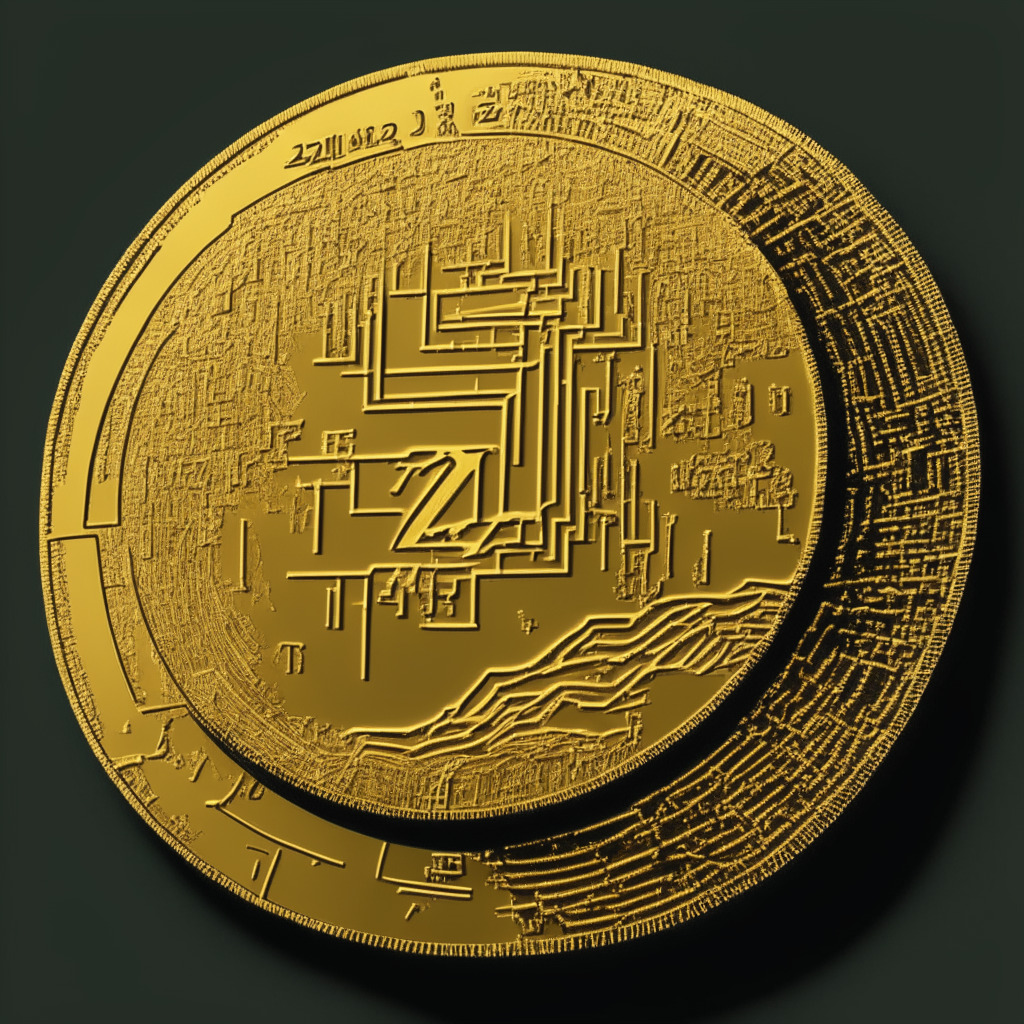“Cyprus is tightening regulations on Cryptocurrency Service Providers, aligning with international standards and penalties. In Zimbabwe, gold-backed digital tokens are becoming a domestic transaction method with value ensured by national gold reserves. Despite advancements, crypto fraud remains a pressing concern; investors must exercise caution.”
Search Results for: Backed
Unwrapping the Saga of Alameda’s USDT Mints & Zimbabwe’s Gold-Backed ZiG Tokens
“Alameda Research has minted over $38 billion in Tether (USDT) tokens in 2021, indicating that the total value of USDT creation surpasses Alameda’s total assets. The inner workings of this process involve benefiting from trade value discrepancies and ensuring USDT’s dollar peg stability. However, this raises ethical concerns for industry watchers.”
Zimbabwe’s Gold-Backed Digital Tokens: A Game Changer or Double-edged Sword?
Zimbabwe’s central bank has introduced a gold-backed digital token, Zimbabwe Gold (ZiG), as a payment method. Physical gold tokens were introduced last year to entice local investors to invest in national assets. The digitization aims to expand value-preserving instruments and facilitate investment versatility. The strategy’s success, amid socio-economic complexities and inflation, remains uncertain.
Navigating the Waters of Real-World Asset Tokenization: Insights from Backed’s Latest Launch
“Swiss entity Backed has launched its latest product, bIB01, on the Base blockchain, offering a digital engagement tool for traditional finance enthusiasts. Backed’s tokenized securities, or bTokens, represent real-world assets like corporate bond ETFs and treasury ETFs. Despite limitations for US-based investors, this marks an intriguing merger of traditional assets with digital technology.”
Blockchain’s Future: How Backed Finance Tokenizing Government Bonds Challenges the Status Quo
“Backed Finance has launched the world’s first tokenized government bond on the Base network, marked as blB01. This innovative move provides investors with a way to monitor the value of the asset without direct exposure. However, due to unclear regulations, it remains inaccessible to U.S. investors.”
Introducing DRAM: Dirham-Backed Stablecoin Aims for Global Impact Amidst Regional Restrictions
Swiss company DTR presents a Dirham-supported stablecoin, DRAM, aiming to facilitate global value transfer. Despite its non-availability in UAE and Hong Kong, the token, developed by Dram Trust is listed on decentralized exchanges like Uniswap, PancakeSwap trading with Binance Coin.
Unfolding the DRAM Narrative: A Dirham-Backed Stablecoin Amid Regulatory Challenges
“Distributed Technologies Research has developed DRAM, a Dirham-backed stablecoin listed on DeFi protocols Uniswap and PancakeSwap. The stablecoin aims to bring stability to countries with high inflation, linked to UAE’s native currency performance. However, regulatory limitations present challenges to its acceptance and growth.”
Reshaping Crypto Landscape: Impact and Prospects of U.S. SEC-backed Ethereum ETFs
“The Ethereum ETFs’ approval by the U.S. Securities and Exchange Commission symbolizes a crucial regulatory progression, and, despite low initial trading volumes, it opens the door for crypto market expansion. However, investor preferences and wavering organizational confidence could influence the ETFs’ success trajectory.”
North Korean Hackers’ $47 Million Crypto Stash: A Glimpse into the Dark Realm of State-Backed Cybercrime
Reports suggest that the notorious North Korean hacking group Lazarus Group has a cryptocurrency reserve worth over $47 million, mostly in Bitcoin, according to institutional crypto platform provider, 21.co. The hacker group’s stash was tracked to 295 wallets identified by the US Government.
Is PayPal’s Ethereum-based Stablecoin, PYUSD, Truly 100% Asset-Backed? Examining the Claims
“PayPal’s Ethereum-based stablecoin, PYUSD, has full asset backing, primarily from U.S. Treasury reverse repurchase agreements, says Paxos. Though overcollateralization safeguards assets, it could limit profits. Some PYUSD assets are in uninsured cash deposits, reflecting typical banking risks. PYUSD’s transparent operation may soothe some investors while raising others’ skepticism.”
Risk, Regulation and Innovation: The Saga of Crypto-Backed Loans in Australia
“Australian fintech Block Earner plans to introduce a new Bitcoin-secured loan service, despite possible regulatory issues. The product, expected by end-September, aligns with licensing structures and adheres to Australian credit license rules, according to the company’s co-founder and Head of Business.”
Exploring Bitcoin-Backed Real Estate Investments in the Cayman Islands: An Innovative Strategy or a Risky Gamble?
Bitcoin financial services firm, Ledn, introduces a new pathway for Bitcoin-backed loans to invest in Cayman Islands’ real estate. This synergy between the digital economy and real estate could allow investors to leverage their BTC holdings as collateral, potentially gaining permanent residency if investments exceed $2.4 million. Concerns remain over BTC’s market volatility and its potential impact on these investment schemes.
Binance Discontinues Crypto-Backed Debit Card in Latin America & Middle East: Strategy or Setback?
“Binance discontinues its crypto-backed debit card in Latin America and the Middle East, affecting less than 1% of users. This follows the earlier deactivation of Binance Connect, pointing towards a potential strategic shift. However, the lack of transparency arouses uncertainty, underscoring the need for clarity and trust in the crypto world.”
Sudden Exodus from Crypto-Backed Funds: Market Tremors or Necessary Adjustment?
Concerns over the SEC’s potential lack of approval for a Bitcoin ETF have triggered significant changes in the crypto sector, with $55 million recently withdrawn from crypto-backed investment funds. Bitcoin-backed funds saw a $42 million withdrawal, funds linked to Ethereum lost $9 million in value, and funds connected to Binance’s BNB token experienced no noteworthy capital flow despite a challenging week. This market turbulence has spurred ongoing debate about the future and stability of cryptocurrencies.
Future of Gold-Backed BRICS Currency: A Dream or Reality? Debating Pros, Cons, and Bitcoin Effect
“Macroeconomist Lyn Alden argues against the feasibility of a forthcoming gold-backed BRICS currency, citing it a tough challenge for BRICS members. Doubts are raised about the model backing a fractional-reserve banking system with gold.”
Exploring Crypto-Backed Mortgages: The Future Fusion of Blockchain and Real Estate
“Crypto-backed mortgages, secured by cryptocurrencies like Bitcoin and Ethereum, offer a new way of accessing loans. These transactions use blockchain technology and smart contracts to ensure safety and transparency. Yet, market volatility and security breaches pose potential challenges.”
Zimbabwe’s Gold-Backed Digital Tokens: A Bold Tackle on Bloating Inflation
Zimbabwe’s Reserve Bank is preparing to release Gold-Backed Digital Tokens (GBDT), also known as ZiG, designed for public use. This nationwide project aims to educate Zimbabweans on the benefits and usage of digital currency, while managing inflation and offering an alternative investment to the US dollar.
Tokenizing Ghana’s Commodities: A Blockchain-Backed Path to Prosperity or a Fear-Induced Stalemate?
“Tokenization of commodities like gold, cocoa, and oil through blockchain could transform economies of African nations such as Ghana. This process would reduce transaction fees, amplify revenue, and open new trading avenues. However, hesitation in adopting and integrating crypto technologies in regulatory frameworks remains a significant obstacle.”
Zimbabwe’s Launch of Gold-Backed Digital Tokens: A Bold Move in Turbulent Economic Times
Zimbabwe’s central bank is contemplating the introduction of gold-backed digital tokens (GBDT) for retail transactions as an alternative to the heavily relied upon US dollar. The GBDTs are backed by physical gold reserves and offer divisibility, making them more convenient and value-preserving. These could potentially help in combating the crippling inflation rate and provide a base for a future central bank digital currency ecosystem.
Bitcoin-Backed ETF Approval: Political Climate’s Influence and the 2024 Election Saga
“Former SEC official, John Reed Stark indicates that a spot Bitcoin-backed exchange-traded fund (ETF) approval in the US is unlikely in 2023, due to multiple considerations held by the current SEC. Crypto-friendly regulations and the approval of a Bitcoin spot ETF, might be more feasible with a Republican-led Administration and SEC Commissioner after the 2024 elections.”
Wyoming’s Revolutionary Leap: State-backed Stablecoin Project and a Hefty Paycheck Higher than the Governor’s
The US state of Wyoming plans to hire an executive director for a groundbreaking stablecoin project, a commission introduced after the Wyoming Stable Token Act was recently approved. The commission’s authority allows it to issue a US dollar-pegged stablecoin in Wyoming, redeemable for dollars in the state’s bank account. With desired qualifications including blockchain expertise and understanding of Wyoming’s legislative operations, the Commission aims to issue a stablecoin by end of 2023.
The Bahamas to Disrupt Traditional Cross-Border Payments with USDC-Backed Wallet
“Island Pay, a Bahamian fintech firm, launches a digital wallet named CiNKO, leveraging the USDC stablecoin for financial inclusion. Unlike volatile cryptocurrencies, USDC provides stability, thereby reducing costs in cross-border transactions and greatly aiding the remittance landscape in Latin America.”
Regulatory Uncertainty, DeFi Accountability, and Cryptocurrency-backed Dollar: A Crypto Crossroads
Regulation discussions remain a pressing issue in the cryptocurrency space. With the SEC undecided on Ripple’s ruling, a newly-introduced U.S Senate bill targeting decentralized finance (DeFi), and proposals of Bitcoin being utilized to strengthen the U.S dollar, the future of cryptocurrency is fascinatingly unpredictable.
Emerging Crypto-Backed Bank in Myanmar: An Answer to Financial Inclusivity or a Regulatory Nightmare?
Myanmar’s Spring Development Bank, a crypto-based banking institution, is set to launch on July 22nd, marking significant strides towards financial inclusivity through blockchain technology. Backed by the National Unity Government, it’s hoping to enhance financial services for the Burmese people, offering an alternative to the military-supervised banking system. However, it also poses potential regulatory challenges.
Unlocking Liquidity with Luxury: A Look at NFT-backed Loans in DeFi Sector
A decentralized finance borrower used a Non-fungible Token (NFT) backed by a luxury watch as collateral for a $35,000 loan. This innovative lending practice offers anonymity and access to global liquidity but adds an element of centralization. Critics question the necessity of NFTs in the process. This approach is forging a new pathway in the world of digital financing.
The Downfall of Petro: A Tale of Venezuela’s State-Backed Cryptocurrency
“Petro, Venezuela’s state-backed crypto, is facing a downfall after a promising start. The state agency pioneering it has disbanded following a corruption crackdown, halting development work. International sanctions and misuse by corrupt officials have expedited its decline, leaving its future looking bleak.”
Zimbabwe’s Gold-Backed Digital Tokens: A Solution to Hyperinflation or Just a Mirage?
The Reserve Bank of Zimbabwe issued gold-backed digital tokens to stabilize the local currency and offer an alternative to the Zimbabwean dollar. However, experts argue that digital tokens alone cannot tackle high money supply growth, the root cause of the economic problem, and suggest focusing on macroeconomic policies and controlling money supply growth instead.
BRICS Gold-Backed Digital Currency: Boon or Global Economic Game Changer?
The upcoming BRICS Summit in 2023 may unveil a gold-backed digital currency to enhance financial independence for Brazil, Russia, India, China, and South Africa, reducing reliance on existing monetary systems like the US Dollar. This unified digital currency could increase investment, growth, trade, and cooperation within BRICS, benefiting the global economy and potentially reducing the dominance of the US Dollar and euro.
Celebrity-Backed Santo Spirits NFT Loyalty Program: Innovative Marketing or Unnecessary Detraction?
Guy Fieri and Sammy Hagar launch an NFT-based loyalty program for their Santo Spirits brand, utilizing blockchain technology for fan engagement and community building. The innovative strategy combines celebrity, spirits, and technology, reflecting the growing potential of NFTs in various industries.
Raft’s stETH-Backed R Stablecoin: Innovation or Risky Experiment?
Raft’s new U.S. dollar stablecoin R, backed by Lido’s staked ether (stETH), introduces a unique offering in the crypto world. With a focus on avoiding inherent risks associated with fiat assets as collateral, Raft’s stablecoin aims to attract large players in the liquid staking ecosystem and withstand ongoing regulatory pressures.
Japan’s MUFG Unveils Progmat Coin: A New Era for Bank-Backed Stablecoins & Cross-Chain Solutions
Japan’s MUFG unveils Progmat Coin, a stablecoin issuance platform supporting local bank-backed stablecoins on multiple public blockchains. The platform aims to provide a universal digital asset payment method for stablecoins, cryptocurrencies, and a Japanese CBDC while addressing potential security concerns.
Zimbabwe’s Gold-Backed Crypto: A Stabilizing Force or Risky Venture Against IMF Warnings?
The Reserve Bank of Zimbabwe sold $39 million worth of gold-backed digital tokens despite IMF warnings, aiming to stabilize the economy and address local currency depreciation. However, the IMF recommends liberalizing the foreign-exchange market, citing concerns about financial stability risks, operational risks, and governance risks.































